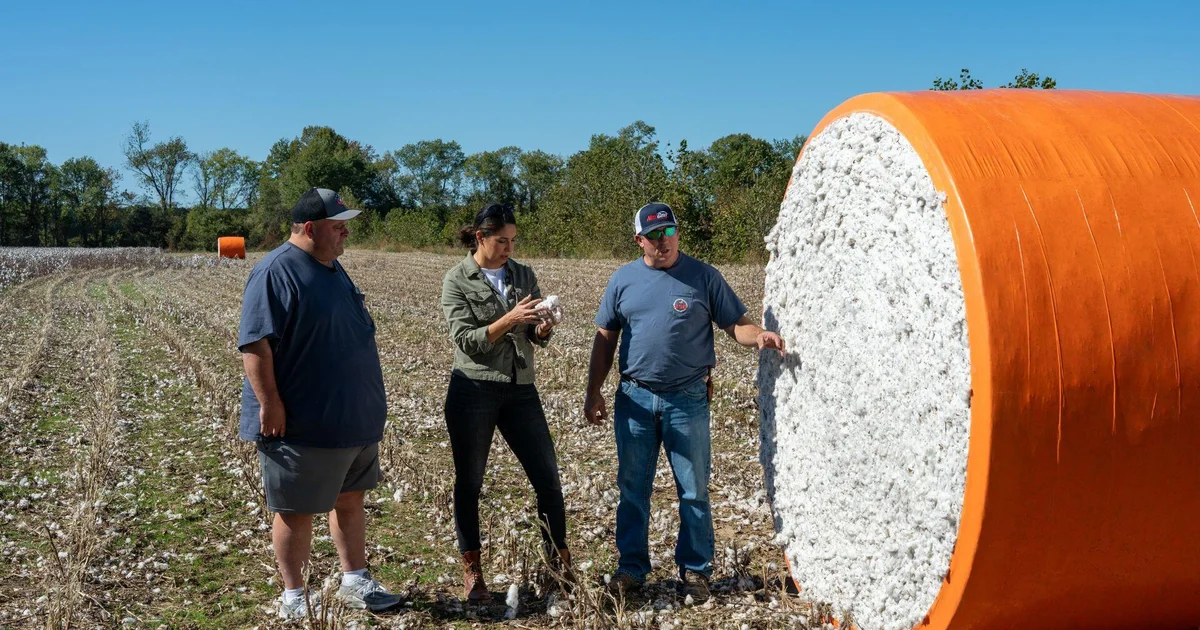Copyright cbsnews

American farmers have long struggled with high costs and low prices for their crops. But this year there is even greater uncertainty in the fields.China stopped buying all U.S. soybeans in May — retaliation for President Trump's tariffs. Many American farmers were left without their largest export market.President Trump and China's president Xi Jinping came to a temporary truce. But farmers told us that whatever happens next with tariffs, the problems on their farms continue to run deep. We went to rural Tennessee and Missouri and met soybean and cotton farmers who told us they fear they could be the generation to lose the family farm. Since 1855 the West Tennessee State Fair has been the place where farmers from across the state come to show off their prized livestock and crops.It's where we met Jeffrey Daniels and Franklin Carmack. Friends since high school, they grow cotton, soybeans and corn on their family farms.Jeffrey Daniels: As far back as I've been able to trace, uh my great granddaddy's daddy was a sharecropper. And then it just got passed down through the generations. Cecilia Vega: I guess you could say you've got farming in your blood.Franklin Carmack: Yes.Jeffrey Daniels: Yes, ma'm.Franklin Carmack: And it's got to be in your blood nowadays to keep doing it.Instead of showing crops at the fair this year like other farmers, they are selling T-shirts made from the cotton they grow to offset their losses in the fields. They sold about 250 shirts — at $35 a piece, it was hardly enough.This year combined, they expect to lose nearly $800 thousand dollars. leaving them in the red like many farmers across the country. Major row crops, including corn, soybeans, cotton and wheat, have not been profitable since at least 2022.Jeffrey Daniels: You know, we're selling our commodities at the same price that we were selling them for and that our grandparents were selling them for in the 70s. So, you know, if you think about that, what can you go buy today that costs the same as it did in the 70s?Cecilia Vega: Nothing.Jeffrey Daniels: Nothing.Times are especially tough now because of what are called input costs — everything a farmer needs to pull income from the ground such as seed, equipment parts and fertilizer. Those costs have increased by more than 30% in the last five years, in part due to inflation and rising interest rates.Franklin Carmack: The morale in the farming industry, not just farmers, is the lowest I've ever seen. Everybody's on edge.In the first six months of 2025, there were 57% more farm bankruptcies than the same period last year. Daniels and Carmack say tariffs have made this year even harder.Jeffrey Daniels: Every time we go buy somethin' now, you know, the tariffs, what I've seen-- uh the tariffs pass down to the consumer. Cecilia Vega: So if you have to go buy a new sprayer like the one behind you.Jeffrey Daniels: Anything that comes from China that's on that sprayer, there's a tariff and they're just going to pass it directly to us.Cecilia Vega: So the tariffs are hitting you more on the purchasing end than they are on the crop sales end.China primarily uses soybeans to feed its massive livestock industry, grinding the beans into powder for feed.Soybeans have long been the largest U.S. export crop, worth nearly $25 billion last year, until sales ground to a halt this past May. It's not just the soybean market; cotton farmers have struggled with dwindling prices and decreased global demand as clothing manufacturers use more synthetic fabrics.Daniels and Carmack have had to take on second and third jobs, not just selling T-shirts, but driving trucks and repairing boats when they are not in their fields. Cecilia Vega: You've said you have almost no equity left.Jeffrey Daniels: It's getting down, It's getting, it's getting low.Cecilia Vega: You think you can make it another year?Jeffrey Daniels: I don't know. I don't know.Jeffrey Daniels: Do you just keep going, rolling the dice, hoping things will turn? I mean, it's not looking good.President Trump has promised a new bailout for American farmers, as much as $13 billion dollars that he said would be paid for by the tariffs.President Trump (at White House in September 2025): "We're going to take some of that tariff money that we made, we're going to give it to our farmers who are, for a little while, going to be hurt until it kicks in, the tariffs kick in to their benefit." Like most farmers we spoke to, Daniels and Carmack say they'd rather work their fields than rely on taxpayer money.Franklin Carmack: It will help pay some bills, but that's not fixing the problem. It's a band aid when we need stitches.Cecilia Vega: Can you wait?Franklin Carmack: No. Cecilia Vega: Can you wait this out?Franklin Carmack: Farm families can't wait.Cecilia Vega: I hear it's affecting your health.Franklin Carmack: YesFranklin Carmack: Four blood pressure pills a day, three different medicines. Two years ago, none.Cecilia Vega: What do you think about when you go to bed at night?Franklin Carmack: Um, what's gonna be left in a year, two years? Am I the one that broke what started in the late 1800s.Nearly all U.S. farms are family owned. And farmers told us one of the greatest pressures they face today is maintaining that legacy, keeping their farms in the family in the face of mounting debts.We were surprised by how often our conversations turned to the issue of farmers taking their own lives, something that has plagued farming communities for generations. But farmers we spoke to told us concerns for their neighbors rise when crop sales drop.This video went viral in the agriculture community last year. Soybean farmer Alex Kerr showed a grim reality in Illinois, where he also sells used farm equipment.Alex Kerr (from viral video:): There are three tractors up here that I bought on auction–and I'm not going to tell you which ones-- but they came off of suicide. The reason that the farmers are no longer there. The reason that I've got the tractors.The suicide rate among agriculture workers is three times higher than the general working population, according to the CDC's most recent data in 2021.Our reporting shows that many rural mental health groups are now seeing increased crisis calls to their hotlines.Cecilia Vega: Do you feel like something's different right now?Jolie Foreman: I do. And-- and to put my finger on it, it's just-- it's really hard. But I know the numbers are going up. I know more people are affected. I know the prices of everything get higher and higher-- and the stresses are added to it.Jolie Foreman runs Shelby County Cares, a nonprofit focused on the high number of suicides among farmers. The organization is named after her eastern Missouri County, where there are no stop lights and one therapist for 6,000 people.Cecilia Vega: when you first started, you were seeing--how many people take their own lives?Jolie Foreman: So back in '22, if you calculated it out, it was averaging out to about a life every three months. And it was like, "This has to stop."Though it's difficult to know how many lives have been saved, Foreman believes her program is working.Jolie Foreman: Shelby County had the highest rate of suicide per capita in the state of Missouri.Cecilia Vega: Wow.Jolie Foreman: Suicide is so hard. We cannot really determine our success. We only can calculate the losses. But we do know-- that the numbers here f-- had started to trend down.Nut in neighboring Macon County, Missouri just a few miles away, there were two confirmed farm suicides this year.Jolie Foreman: Research shows that-- for every suicide, 130 people are affected.Cecilia Vega: Are you worried you could see an increase--Jolie Foreman: Yes.Cecilia Vega: --because of the situation?Jolie Foreman: Yeah. And just knowing that the counties around us have had increased, you know, deaths by suicide that's I think why the communities cam together so well.Shelby County Cares connects farmers with therapists, either in person or remotely. Foreman said walk-ins and calls to her office have increased since the beginning of the year. She's learned the best way to get farmers, who are traditionally stoic and fiercely independent. to talk, is through their wives and their stomachs.Holly Klusmeyer: Today we're gonna make taco soup, and crock-pot ranch pork chops, and pulled barbecue chicken.Her way in is a regular gathering of farmers' wives and friends, where we met as they prepared meal kits.Cecilia Vega: How many of you have been touched by suicide in your lives or your communities? Several hands raiseCecilia Vega: Almost everybody at this table.Amanda Strange: They isolate. They bottle things up. they think they need to solve their own problems. And they're afraid to reach out. And they're afraid to lean on people. So they may feel that there's no other way or that somebody's gonna be better off without them.Jess Utterbrink: It's very much this perception of you have to be strong you have to be tough, you know, the weight of the world is ultimately on your shoulders.Cecilia Vega: Do you know farmers personally who have taken their own lives?Jolie Foreman: I do. I do. I mean, in my own family, we've definitely had tragedy and have lost some very, you know, important people in our own family. Since the 1970s, Jolie's father-in-law, Brent Foreman, has lost three relatives, all farmers, to suicide. Two neighbors of the family farm also recently took their own lives.Brent Foreman: I've always had a fear for my kids and-- now my grandkids that we sure don't want history to repeat itself. I you know, no matter how bad things get, things always have a way of workin' out. They-- they'll always get better.Brent and his son Jarrell grow more than 1,000 acres of soybeans and 650 acres of corn on a farm they manage themselves. They also raise more than 200 head of cattle, which means they are not reliant on soybeans as their sole source of income and can afford to wait for details on President Trump's new trade deal.Brent Foreman: I-- I have a lotta faith in him, and a lotta trust in him. And I think he's tryin' to make us the best deal he can for-- for the whole country, but for the American farmer, for-- for the long term. Nearly 80% of voters in what are called farming-dependent counties voted for President Trump in the last election. Jeffrey Daniels: I feel like a lot of American farmers, cattle people, it's a lot, a lot of people probably feel let down currently now. Maybe there's a method to the madness, you know, that's still to be seen.Many are now taking their frustrations directly to Republican lawmakers at townhalls across the country. This fall, the White House promised a $40 billion bailout of Argentina and its president, Javier Milei, President Trump's political ally. Argentina also grows soybeans and is considered a competitor. During the trade war, China had purchased soybeans from Argentina instead of buying them from the U.S. The bailout enraged many American farmers who felt betrayed.Cecilia Vega: President Trump said Argentina has got no money. They have no anything. They're fighting so hard to survive.Franklin Carmack: Come to the farm. Come walk in my shoes.Cecilia Vega: What would you show the president if he took you up on your offer to come and see the farm?Franklin Carmack: I'd show him the daily life that I do from cleaning equipment, running equipment, dispatching trucks. And then I'd hand him a stack of bills. And then I would show him the receipts, what I'm getting from my crop. He's a smart man. I'm not going to take that away from him. And it won't take him the five minutes to say, this isn't going to work.If you or someone you know is in emotional distress or a suicidal crisis, you can reach the 988 Suicide & Crisis Lifeline by calling or texting 988. You can also chat with the 988 Suicide & Crisis Lifeline here.. For more information about mental health care resources and support, The National Alliance on Mental Illness (NAMI) HelpLine can be reached Monday through Friday, 10 a.m.–10 p.m. ET, at 1-800-950-NAMI (6264) or email info@nami.org.Additional support for agricultural communities is available here.Produced by Michael Rey. Associate producer, Jaime Woods. Broadcast associate, Katie Jahns. Edited by April Wilson.



